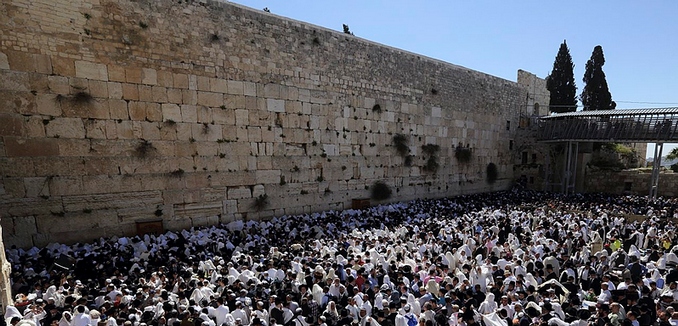The denial of the historical Jewish connection to Jerusalem’s Temple Mount in last week’s “deplorable” UNESCO resolution is the “opposite of constructive and [deserves] only contempt,” The Boston Globe‘s editors asserted on Tuesday.
The Arab-sponsored resolution, which the editors called a “blatant historical fabrication,” had “pointedly ignored Judaism’s connection to the Temple Mount,” even though “[for] millennia, Jerusalem and the Temple Mount have been central to Jewish self-awareness — and thus to Christianity as well, since the Temple figures prominently in the Gospels’ account of the life of Jesus.”
Yet UNESCO still passed the “Orwellian resolution” with a vote of 10-2 with eight abstentions, which “not only accuses Israel of endangering the revered compound, but also refers to the site throughout solely by its Arabic name, Haram al-Sharif.”
The editors described the resolution as being part of an “ongoing propaganda campaign by the Palestinian Authority to ‘de-Judaize’ the identity of Jerusalem, the foremost Jewish city on earth.” They noted that efforts to deny the Jewish connection to the Temple Mount began in the 1990s, when then-Palestinian leader Yasser Arafat called Jesus a Palestinian while the Palestinian Authority-appointed Mufti denied any historical Jewish presence in Jerusalem. Ironically, “the Jewish significance of Jerusalem and the Temple Mount is so clear-cut that, decades ago, even the city’s Muslim leaders once stressed the point,” they added.
Referring to “malicious distortions of history,” the editors highlighted that “such falsifications have triggered wars and incited bloodshed.” They also pointed to the significant criticism that the resolution attracted, including from U.S. Ambassador to UNESCO Crystal Nix-Hines, the Czech Republic’s parliament, and outgoing United Nations Secretary General Ban Ki-moon, who warned that the resolution “will only feed violence and radicalism.”
The Globe‘s editors concluded by emphasizing the resolution’s dishonesty in accusing Israel of endangering the Temple Mount:
Jerusalem is sacred to Jews, Christians, and Muslims. Its holy sites have never been safer, or open to more people, than in the 49 years since it was reunified under Israeli administration. If UNESCO has constructive suggestions to improve the status quo, by all means let it proffer them. But spiteful resolutions that distort history are the very opposite of constructive and deserve only contempt.
As UNESCO voted to erase Jewish ties to the Temple Mount, the Israel Antiquities Authority (IAA) unearthed significant archaeological evidence of that ancient heritage. Last week, the IAA presented the oldest Hebrew-language mention of Jerusalem yet discovered, dating back some 2,700 years to the time of the First Temple. Days later, Israeli archaeologists revealed that artifacts from the First Temple period had been found in situ on the Temple Mount. The week before those two announcements, the IAA said that it had located the place where Roman troops breached the walls of Jerusalem during their siege of the city and eventual destruction of the Second Temple nearly 2,000 years ago.
Evidence of the Christian history of Jerusalem also emerged last week when the National Geographic reported that workers restoring the Church of the Holy Sepulchre claimed to have uncovered the tomb of Jesus, which was buried under layers of marble for centuries.
[Photo: Yaakov Naumi / Flash90 ]




